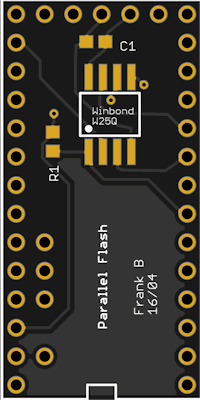Hi,
some of you may have noticed, that i added an SPI Flash with 4-BIT parallel connection to an other project.
Maybe it is useful for other projects, too. I have uploaded the library to https://github.com/FrankBoesing/ParallelFlash, along with eagle schematics and board (you can upload the .brd-file to OSH-park or digistump).
It is highly experimental, but so far i have'nt had any problems with it.
The board is totally untested (but it is so simple that it should work ), i tested the library in my other project, with an W25Q128FV only.
), i tested the library in my other project, with an W25Q128FV only.
I measured transfer-speeds (for reading) of more than 5 Megabytes / Seconds.
"TeensyTransfer" is compatible, just enable "_HAVE_PARFLASH" in the *.h file.

some of you may have noticed, that i added an SPI Flash with 4-BIT parallel connection to an other project.
Maybe it is useful for other projects, too. I have uploaded the library to https://github.com/FrankBoesing/ParallelFlash, along with eagle schematics and board (you can upload the .brd-file to OSH-park or digistump).
It is highly experimental, but so far i have'nt had any problems with it.
The board is totally untested (but it is so simple that it should work
I measured transfer-speeds (for reading) of more than 5 Megabytes / Seconds.
"TeensyTransfer" is compatible, just enable "_HAVE_PARFLASH" in the *.h file.

Last edited:

